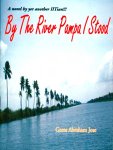
Metro Plus Kochi
Published on Mondays & Thursdays
Features: Magazine | Literary Review | Life | Metro Plus | Open Page | Education Plus | Book Review | Business | SciTech | Friday Review | Young World | Property Plus | Quest | Folio |
Metro Plus Bangalore Chennai Coimbatore Delhi Hyderabad Kochi
21 Dec 2006
From alongside the Pampa Geeta Abraham Jose reveals the background of her book By The River Pampa I Stood, which is based on the Syrian Christian community
"The Syrian Christian community was un-charted territory till Arundhati Roy put it on the literary map. But I decided to write about something I know. I know what's happening in this community." Taking advantage of the topicality of Kerala, Geeta Abraham Jose ventured to write By The River Pampa I Stood.
Based in Dubai, she was recently in Delhi for the official launch. An IIT Madras post-graduate in Electronics and Communication Engineering, she started writing the book in 1995, when her husband had just moved to Dubai.
An engineer and professor she asserts that literature is her first love. She moved to engineering only because she got good marks! Writing was her way of unwinding at the end of the day. Her daughter would sit beside, watching her. Today, her daughter in senior school hopes to write her own book soon.
She is bashful of the rejoinder on the cover of the book, "A novel by yet another IITian!!!". "It is not an IIT story," she insists. But she admits she sent the book for publication, inspired by fellow IITian Chetan Bhagat's success.
While she desists from calling the book autobiographical, she says has taken stories from older people in the family. "For me an old person is a store house," she admits with a genuine laugh, "When a grandmother dies, I feel sad at all the stories that have died with her."
By The River Pampa I Stood is the story of a grandmother and granddaughter and the tangents of their lives. But Jose's aim is to show, "though times are different, mindsets have not changed, especially when it comes to marriage."
The status quo of the community does affect her. "The Syrian Christians pride themselves on dating back to the Apostles. As a community they are resistant to change." But her beliefs and book betray an optimistic view. "You cannot step twice into the same river for the waters are continually moving on," she quotes. Taking the example of her book she says, "In the end, change does happen. At first the patriarchy went to great extent to preserve the family, but towards the end, a new system emerges. Change becomes inevitable."
While preferring to stick to the "Queen's English", the book does use different Malayalam verses to re-create the ambience. Songs of the workers and rhymes of children are occasionally woven into the text.
The river Pampa has been a constant for Jose's childhood. Memories and legends are associated with it. The book, she hopes, will also promote tourism in Kerala as she describes in detail the beauty of the backwaters.
by
NANDINI NAIR






